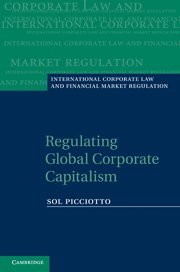Product desciption
Regulating Global Corporate Capitalism 1st Edition Sol Picciotto by Sol Picciotto 9780521181969, 9781107005013, 0521181968, 1107005019 instant download after payment.
This analysis of how multi-level networked governance has superseded the liberal system of interdependent states focuses on the role of law in mediating power and shows how lawyers have shaped the main features of capitalism, especially the transnational corporation. It covers the main institutions regulating the world economy, including the World Bank, the IMF, the WTO and a myriad of other bodies, and introduces the reader to key regulatory arenas: corporate governance, competition policy, investment protection, anti-corruption rules, corporate codes and corporate liability, international taxation, avoidance and evasion and the campaign to combat them, the offshore finance system, international financial regulation and its contribution to the financial crisis, trade rules and their interaction with standards especially for food safety and environmental protection, the regulation of key services (telecommunications and finance), intellectual property and the tensions between exclusive private rights and emergent forms of common and collective property in knowledge
''This analysis of how multi-level networked governance has superseded the liberal system of interdependent states focuses on the role of law in mediating power and shows how lawyers have shaped the main features of capitalism, especially the transnational corporation. It covers the main institutions regulating the world economy, including the World Bank, the IMF, the WTO and a myriad of other bodies, and introduces the reader to key regulatory arenas: corporate governance, competition policy, investment protection, anti-corruption rules, corporate codes and corporate liability, international taxation, avoidance and evasion and the campaign to combat them, the offshore finance system, international financial regulation and its contribution to the financial crisis, trade rules and their interaction with standards especially for food safety and environmental protection, the regulation of key services (telecommunications and finance), intellectual property and the tensions between exclusive private rights and emergent forms of common and collective property in knowledge''--''The past few decades have seen major changes in the patterns and forms of international economic activity, and in their political, legal and institutional setting. The aim of this chapter is to outline the contours of these changes, to analyse and discuss the main concepts through which they might be grasped, and in that way to provide a basis for the more detailed studies in the succeeding chapters. 1.1 Globalization, regulation, legalization 1.1.1''-- Read more... 1. Transformations of global governance -- 2. Liberal internationalism: strengths and limits -- 3. From interdependence to fragmentation -- 4. Corporations and competition -- 5. Corporate rights and responsibilities -- 6. International taxation -- 7. Regulation of international finance -- 8. The WTO as a node of global governance -- 9. Intellectual property rights -- 10. Law and legitimacy in networked governance


